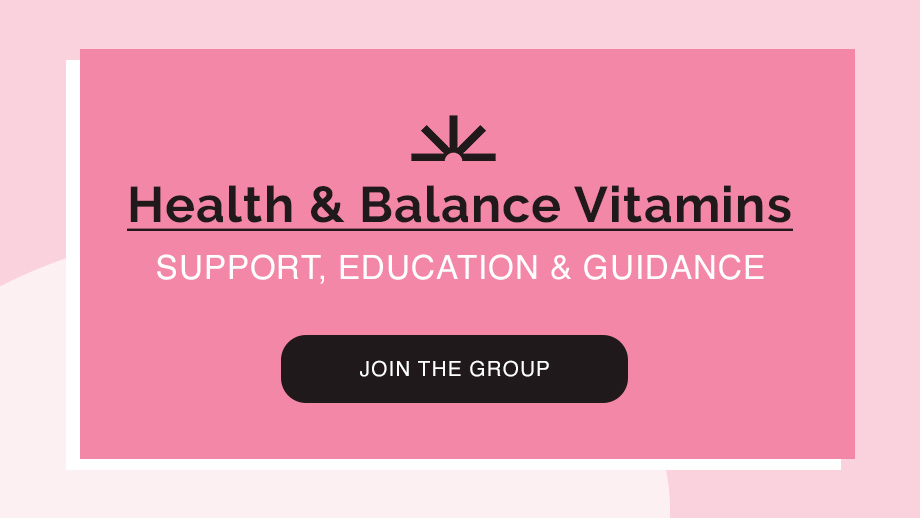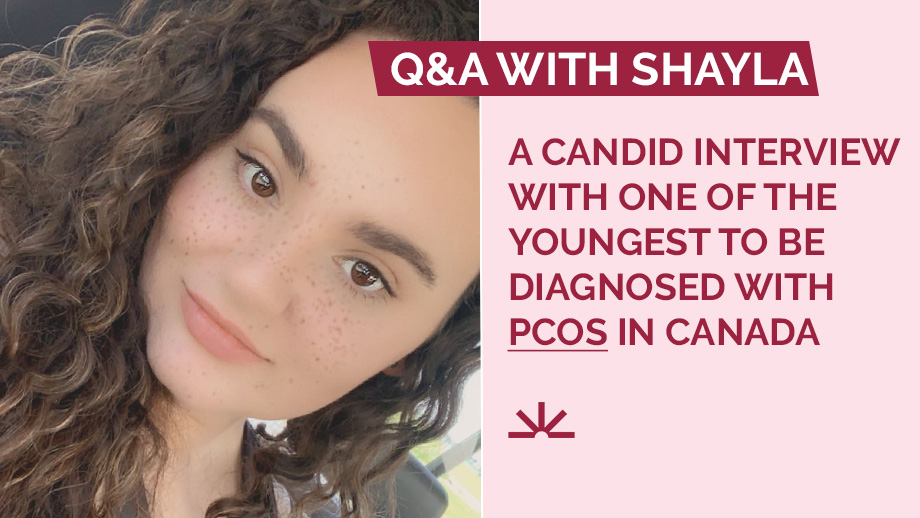Shayla – a bubbly, outgoing book lover – sits down with us to share some of the stories and lessons she has learned from her 14-year battle with PCOS, which started at the young age of 11.

Shayla / Living With PCOS At 21
Despite being diagnosed at such a young age, Shayla has come to resent the medical system in Canada – as a whole – due to the treatment she received, or lack thereof.
‘I believe the medical system in Ontario and greater Canada needs to focus on understanding PCOS better. I know my eating disorder stemmed directly from the treatment I received from my practitioners in those pre-teen years. ‘
Further, it’s not all that uncommon for women to be blamed for their PCOS and symptoms.
Shayla wrote: ‘My doctors blamed me for developing the condition because back in 2009 it was believed that PCOS was caused by a bad lifestyle, similar to how they saw type 2 diabetes at the time.’
She then followed with: ‘It’s difficult to not internalize the words medical practitioners say, especially at 9, and start to have an unhealthy amount of self-hate stemming from the treatment.’
And although this post is not a direct criticism of the medical industry’s standard of treatment for PCOS, it does shed light on the lack of understanding that we so often hear about.
Without further ado, let’s dive into Shayla’s Q&A.
Navigating The PCOS Diagnosis
How Did Being Diagnosed with PCOS at Such a Young Age Impact Your Childhood & Adolescence?
Under 27% of those with PCOS will be diagnosed in preadolescent years (9-12 yrs), as is the case for Shayla.
She states: ‘My childhood In one word – shocking’
‘Kids already struggle at this age to discover who they are and where they fit into the world, so having something that is different compared to your peers makes you a target.’
Kids can be bloody brutal. As you’d expect, Shayla was a victim of that brutality. And she makes a good point of comparison for those who need illustration:
‘…I compare it to how kids treat someone with braces or glasses. It’s new, different, and kids can be cruel in how they react to that.’
But for Shayla, it was worse than that: ‘For me, my labels were worse. I was called pig, fat, ugly, acne freak, disgusting, monster, ogre…the list goes on and on.’
My mum used to say, sticks and stones can break my bones but words will never hurt me.
Forget it, mum. Words CAN hurt us. And by that, I mean our self-confidence, beliefs and our ideas about ourselves take a hit.
Case in point, Shayla. She writes: ‘Because [the bullying] started when I was 9, I became acutely aware of my body at this age, and subsequently developed an eating disorder before I even knew what those were.’
To this day, she continues to battle her disordered eating.
Food for thought:
If the medical industry is [still] following inadequate practice for treating PCOS amongst the masses, then what of the treatment and support for the young minority?
Further, how is one treated with PCOS by their peers at a young age; is it any different in post-adolescence?
Let us know how you feel about this in the comments section below.
‘Everything Will Be Okay’
Is There Anything You Know About PCOS Now That You Wish You Knew Back Then?
Despite Shayla’s ‘shocking’ childhood, she learned invaluable lessons, which eventually help her to become stronger, smarter, and more hopeful.
Shayla wrote: ‘There was a period when I was 18-20 when I started to make changes in my life to be healthier, and subsequently, my PCOS went “away”’.

Healthier, Happier Shayla
But like with any journey, there are things we wish we knew when we started. For Shayla, education is one of them: ‘I wish I could have told my 9-year-old self about insulin resistance, weight training, and disordered eating.’
She followed up with a lesson we could all use, wherever we are in our personal journeys: ‘I also wish I could hold my 9-year-old self and tell her everything would be okay’.
And okay it will be x
Shayla’s Treatment Methods
What Treatment Method(s) – Natural or Otherwise – Have Helped You the Most to Manage PCOS?
Ultimately, how you manage your PCOS – and the treatment(s) you choose – is generally determined by your goals and your hormonal imbalances. And this, my friend, makes every case of PCOS unique to the individual.
You’ve heard it before but I’ll say it again: What works for one, may not work for the other.
For Shayla, it is ‘Intuitive eating, weight training/low impact and compound exercise, self-love, and cycle tracking’.
She then writes: ‘Hair growth with PCOS is my biggest challenge, so I started to do laser hair removal on my face, chest, and arms. I know this is a band-aid solution but the confidence it has given me is amazing.’
Give it a try, it might work for you x
Generally, however, we recommend getting to the root cause of the problem, which invariably is hormonal imbalance. Although, the sentiment around laser hair removal is quite positive within the PCOS community.
As for root-cause treatment methods, science just doesn’t have too much to say. Sadly, this often leads to advice being riddled with subjectivity – especially when anecdotal evidence is the foundation.
Having said that, there are studies that vouch for certain approaches.
For example, adjusting your diet to include more PCOS-friendly foods is a scientifically validated tool for improving symptoms.
Exercise also should not be ignored. According to a 2020 review, ‘Recommended guidelines for women with PCOS include vigorous aerobic exercise and resistance training to improve measures of insulin sensitivity and androgen levels’.

Best Workouts For PCOS
The Emotional Side Of PCOS
PCOS Can Have Quite An Emotional Impact, Which Is Often Overlooked. What Resources Have Helped You Deal With This Ugly Side Of The Condition?
According to a recent systematic review, ‘the diagnosis and life experience of PCOS had a disability score that was similar to or surpassed that of heart disease, diabetes mellitus, or breast cancer’.
In other words, the emotional burden of PCOS is equal to or more than someone diagnosed with any of those conditions mentioned above. Wow.
Thankfully, there are resources readily available to you. To help us with this issue, we asked Shayla about it – who has explored several options during her 14-year battle with PCOS.
She writes, frankly: ‘Therapy and a good support system’.
Therapy Sessions
For Shayla, therapy was the start of her ‘self-love journey’.

Shayla / Embarking on a Journey of Self-Love
Accompanying this, her therapist decided to refer her to a disordered eating clinic where Shayla was ‘encouraged to sit in on those meetings’.
What a difference that made. She wrote:
‘I left those meetings with a better understanding of disordered eating, how it’s not always anorexia and bulimia, but can be simple things like ignoring hunger cues, forcing a fasting period, trying a new diet and failing, then trying a new one.’
Good Support Systems
It’s not that uncommon for people to have a fear of doctors – especially women with PCOS.
Shayla wrote: ‘When people in PCOS support groups say they have a fear of doctors, I believe them.’
She later says: ‘Thankfully, I have amazing doctors now.’
The question we ponder, though, is what traits and characteristics make for a good doctor to have on your side?
Well, in a UK study, women said they felt they received the best treatment from doctors who:
- Clearly explain the process of making a diagnosis
- Demonstrate a strong understanding of PCOS; enough to provide useful information about what is and isn’t known about the condition.
- Encourage you to participate in developing a treatment plan.
- Offer practical strategies to try, but are willing to suggest new methods when something isn’t working.
Be on the lookout for these important attributes! x
Unsurprisingly, support systems aren’t limited to doctors and health care. Shayla says: ‘My support system was made up of my family and friends and now includes my boyfriend.’

Left: Shayla’s Boyfriend / Right: Her Supportive Mother
In a way, having a strong interpersonal support system is insurance for when the medical industry isn’t quite supportive enough.
Shayla wrote: ‘All of these have helped me find new information on PCOS or be there when a doctor still believed that PCOS was caused by an unhealthy lifestyle, which was backward to blame a 9-year-old for developing the condition.’
Goal-Setting For PCOS
What Are Your Goals For The Next 1-2 Years As Well As Overall Long-Term Goals?
Lifestyle and behavioural management are crucial for an effective PCOS treatment plan. The Journal of Women’s Health states that ‘Outcomes of [weight] management programs in women with PCOS are likely to be improved with the inclusion of behavioural and psychological strategies, including goal setting and self-monitoring’.
Given the importance of goal-setting, we thought it was necessary to explore Shayla’s.
For her, ‘Getting rid of the hair growth’ is a priority. Hirsutism is a confidence killer, so that’s a worthy goal to begin with.
Next, Shayla wrote: ‘Having a more active lifestyle to experience life truly’. Notice that it’s not exactly connected to PCOS.
Wonderfully, the impact of striving for this goal is going to have a positive effect on Shayla’s hormonal imbalances and symptoms. Win!
And last, but not least: ‘Get to a point in my health where I could potentially conceive naturally without medical assistance’.
PCOS is the number one cause of infertility in women; however, to those who believe it is not possible to start a family with PCOS: Yes, it CAN happen.
And if this is something that you are striving for, too, we’re here to support you x
Lessons & Words Of Wisdom
For The Younger People Who Have Recently Been Diagnosed, Are There Any Lessons Or Words Of Wisdom You’d Like To Pass On?
Without beating around the bush, here are Shayla’s words of wisdom for the younger generations (and for all!).
First, ‘Your value as an individual is not diminished by your PCOS’. In fact, I’ll argue that your value is enhanced. Think of the lessons, knowledge and strength that you’ve gained from your experience.
Second – as we have touched on in this post – ‘You can control this part of your life with proper resources and a good support team’.
Shayla follows up with: ‘It’s okay to search for doctors until you find one that treats you like a human being’.
Amen to that. Find a doctor who is worthy of treating you x
And finally, ‘People will be mean, but always stay true to yourself’. Be yourself – the wonderful, unique You; wear your heart on your sleeve, and always remember: You’re not alone in this roller-coaster of a journey.

H&B Vitamins PCOS Support Group (Facebook)
If you have any questions or if anything stood out to you, let us know in the comments below.





